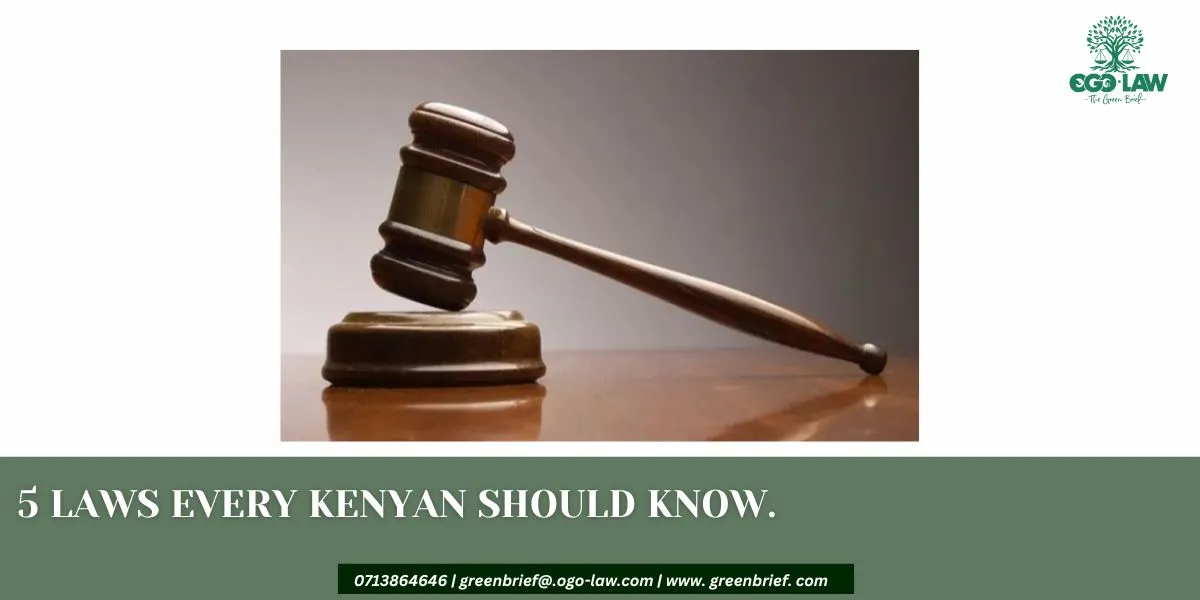5 Laws Every Kenyan Should Know.
In Kenya, it’s not uncommon to hear someone say, “Sikujua ni makosa” (I didn’t know it was a crime). But here’s the truth: the law does not excuse ignorance. Whether you’re a student, boda boda rider, CEO, or house help the law applies to you. Knowing your rights is just as important as knowing your responsibilities.
This article highlights 5 key laws that every Kenyan should know, not just to avoid trouble, but to live and act more empowered.
1. You Can Be Arrested Without a Warrant
Many believe that unless police officers show a warrant, they cannot arrest you. That’s false.According to Section 29 of the Criminal Procedure Code, a police officer can arrest you without a warrant if:
- You’re committing a cognizable offence (e.g., robbery, assault, fraud)
- You are reasonably suspected of having committed such an offence
- You obstruct an officer or attempt to escape
But remember you still have rights, including the right to be informed why you’re being arrested and the right to legal representation (see Article 49 of the Constitution).
2. Defamation Can Land You in Court (Even Online)
That “harmless” Facebook post or viral X (formerly Twitter) thread? It could lead to a defamation suit. Defamation, under Kenyan law, is any false statement that injures someone’s reputation. It doesn’t matter if it was a joke or a rant if it lowers someone’s standing in the eyes of others, you can be sued. And yes, this includes WhatsApp groups, TikTok videos, YouTube comments, or even reposting defamatory content. Before you publish, post, or forward, ask yourself: Is it true? Is it necessary? Is it lawful?
3. You Must Carry Identification
By law, every Kenyan above the age of 18 is required to carry their national ID and produce it upon request by a law enforcement officer.Under the Registration of Persons Act, failure to produce identification may lead to arrest, detention, and a possible fine.So, while it may feel like harassment sometimes, especially in informal settlements or during heightened security operations, carrying your ID is not optional, it’s a legal requirement.
4. Verbal Agreements Can Be Legally Binding
Ever told someone, “I’ll pay you KSh 5,000 next week” and shook on it? Or made a promise over WhatsApp? That can be considered a legally binding contract.
Kenyan law does not always require a written agreement to enforce a contract. As long as there’s:
- An offer
- Acceptance
- Consideration (something of value exchanged)
- Intention to create legal obligations
…then you have a contract.
So yes, your “Ah, usijali, I’ll pay you back next week” can be enforced in court.
5. You Have a Right to Remain Silent (Use It)
Many people panic when they are arrested and begin explaining themselves often without a lawyer present. Article 49 of the Constitution gives you the right to remain silent and not to self-incriminate. This is especially important in emotionally charged situations ]like protests or police stops. What you say can be used against you in court. So if you’re unsure, say politely:“I choose to remain silent until I speak with my lawyer.”
In Conclusion: The Law is Not Just for Lawyers
You don’t have to go to law school to know how to protect yourself. These laws are about daily life , what you post, what you promise, what you carry, and how you speak. In a country where legal systems can feel intimidating or out of reach, information is power. Arm yourself with it. Because the next time you’re asked, “Ulikuwa unajua hii ni makosa?” Let your answer be, “Yes and I know my rights too.”





